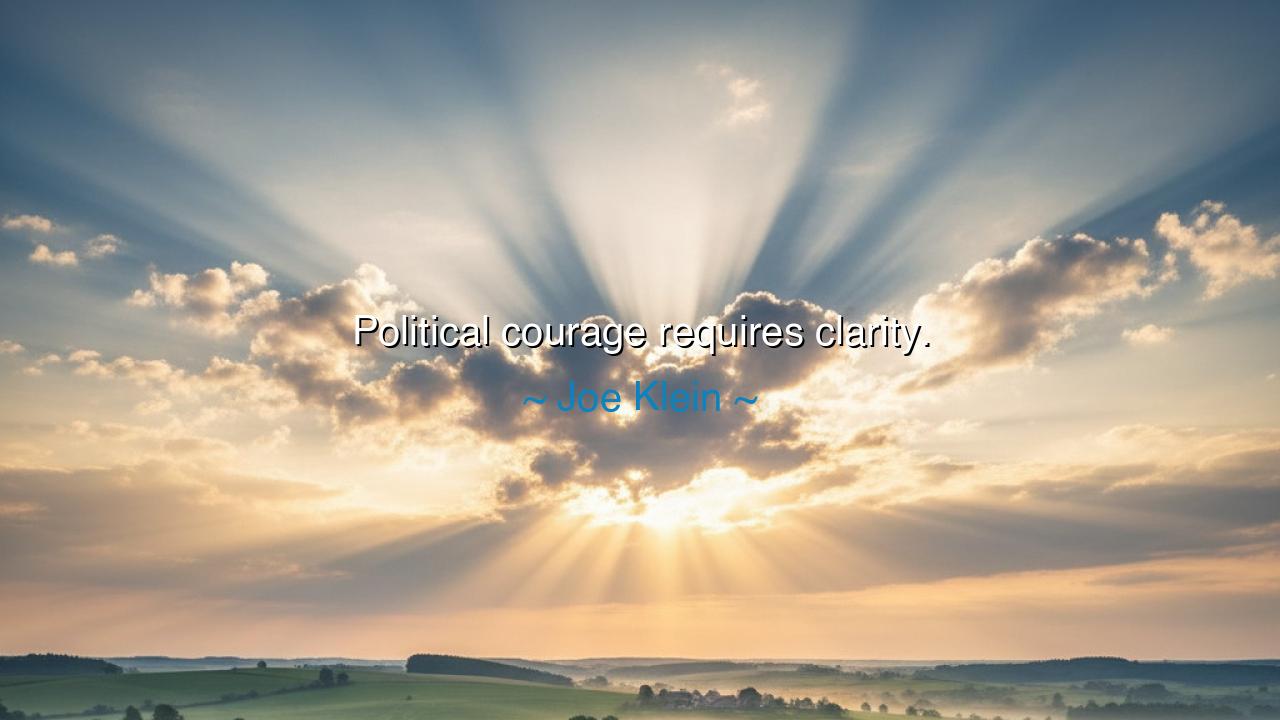
Political courage requires clarity.






“Political courage requires clarity.” Thus declared Joe Klein, the journalist and historian of power, whose eyes had long observed the struggle between truth and ambition in the theater of governance. His words, though few, carry the weight of an eternal principle — that courage in politics, and indeed in life, is not merely the strength to act, but the clarity to see rightly before acting. For action without vision is recklessness, and vision without conviction is cowardice. Only when the two are joined — clear seeing and brave doing — does leadership become noble.
In this brief utterance lies the distillation of wisdom that the ancients themselves might have carved in stone. For the great statesmen of history were not those who shouted the loudest or conquered the most, but those who perceived truth when confusion reigned and held fast to it. Clarity, in Klein’s sense, is not the cleverness of rhetoric or the cunning of strategy. It is moral vision — the unclouded understanding of what is just, what is necessary, and what must be done, even when it costs one’s favor, comfort, or power. To act with such vision is to practice political courage, the rarest and most perilous form of bravery, for it demands standing firm not against enemies alone, but against the shifting winds of one’s own allies and the seductions of expedience.
The ancients spoke often of this union between clarity and courage. Pericles, the great Athenian orator, guided his city through plague and war not by deceit, but by truth plainly spoken. He refused to promise victory when he could not see it, and warned his people of sacrifice when they desired comfort. His courage was born of clarity — the clear understanding that leadership is not the art of pleasing the people, but of preserving the polis. So too did Marcus Aurelius, emperor and philosopher, write that the ruler must see things as they are, not as he wishes them to be, for only in truth can one find justice. To be courageous in politics, he taught, is to stand firm in clarity when others surrender to confusion.
Yet history also reveals the shadowed opposite: how often has confusion disguised as courage led to ruin? Consider the chaos of revolutions born from passion untempered by reason, where men cried for freedom but saw not the chains within themselves. Or the rulers who called themselves bold while marching blindly into folly, mistaking stubbornness for strength. In each case, the lack of clarity — of honest understanding — turned valor into vanity. Joe Klein’s words are a warning to all who wield influence: courage without clarity is not virtue, but violence to truth.
The story of Abraham Lincoln illuminates this principle with the quiet brilliance of moral example. In the darkest hours of the American Civil War, his nation torn apart, Lincoln did not act rashly nor speak hastily. He pondered, listened, and prayed. His decision to issue the Emancipation Proclamation — to make freedom the cause of the Union — was born not of impulse, but of deep and painful clarity. He saw, through the haze of politics and bloodshed, that the war’s purpose must rise beyond survival to moral renewal. That vision, clear and unwavering, gave his courage its power. Without it, his resolve would have faltered; with it, he changed the course of history.
So too, in our own time, the same truth endures. Those who lead — whether nations, communities, or families — must seek clarity before they seek action. They must strip away illusion, pride, and fear, until they can see the heart of the matter with unflinching honesty. Only then does courage find its rightful form: not as defiance born of anger, but as strength born of wisdom. For the one who acts clearly acts with purpose, and the one who acts blindly becomes a danger to all.
Let this then be the lesson: do not mistake noise for conviction, nor confusion for boldness. To be courageous in any field — in politics, in love, in life — is first to be clear. See what is true, even when it pains you. Name what is wrong, even when others fear to speak. Then act, not in haste, but in steadfastness. This is the courage that changes worlds — the courage that stands not upon emotion, but upon clarity.
And so, remember the wisdom of Joe Klein: “Political courage requires clarity.” For all courage is hollow without vision, and all vision is fruitless without the will to act upon it. Seek truth until you can see plainly, and then act upon it though the earth tremble beneath your feet. For in the marriage of clarity and courage lies not only good politics, but the highest calling of the human soul — to do what is right, because you see it as right, and to stand by it, no matter the cost.






AAdministratorAdministrator
Welcome, honored guests. Please leave a comment, we will respond soon